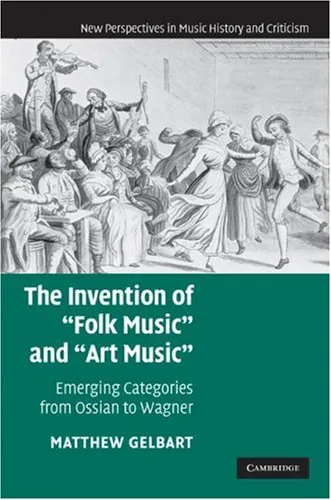The Invention of ''Folk Music'' and ''Art Music'': Emerging Categories from Ossian to Wagner (New Perspectives in Music History and Criticism)
4.0
Reviews from our users

You Can Ask your questions from this book's AI after Login
Each download or ask from book AI costs 2 points. To earn more free points, please visit the Points Guide Page and complete some valuable actions.Introduction
Welcome to an exploration of the intricate and nuanced history of two fundamental categories in music: "folk music" and "art music." My book, "The Invention of 'Folk Music' and 'Art Music': Emerging Categories from Ossian to Wagner," delves into how these classifications emerged, evolved, and impacted musical and cultural thought from the 18th to the 19th centuries.
Detailed Summary
The book travels through the intellectual landscapes of the late 18th and 19th centuries, offering an in-depth examination of how the very concepts of "folk music" and "art music" were constructed and solidified in Western culture. Beginning with the Ossian phenomenon, where James Macpherson's literary creations spurred a fascination with an imagined ancient world, the discussion extends to the ways in which national identity and cultural heritage began to be reflected in music. The text traces the shifts in perception and usage of music that helped craft these categories, considering significant figures such as Johann Gottfried Herder, who advocated for the intrinsic value of the "people's song," and the rise of the art music canon through composers like Wagner. Here, "art music" became synonymous with cultivated, urbanized, and institutionally supported music, refining the separations between amateur and professional, vernacular and elite.
Key Takeaways
- The Evolution of Categories: Understand the gradual and complex emergence of "folk" and "art" music as distinct categories, which were not inherent or self-evident but rather constructed through cultural discourse and power dynamics.
- Cultural and National Identity: Discover how music was instrumental in shaping and expressing national identities, reflecting larger social, historical, and political contexts.
- Influence of Key Figures: Analyze contributions from intellectuals and composers like Herder and Wagner who played pivotal roles in defining and popularizing these categories.
- Intersection of Class and Music: Explore how these musical categories resonated with ideas of class, hierarchy, and cultural elitism.
Famous Quotes from the Book
"Folk music and art music are not mere reflections of society; they are constructions that have been ascribed particular meanings within the evolving frameworks of class, nationality, and cultural identity."
"The imagined worlds of music, much like those of literature, allow us to reconfigure historical memories and forge new narratives of cultural heritage."
Why This Book Matters
Grasping the historical and cultural origins of "folk music" and "art music" allows us to challenge contemporary perceptions and assumptions about music. This book provides musicologists, historians, and the general reader with indispensable insights into how cultural identity and socio-political structures influenced—and were influenced by—musical categories. As we delve deeper into these historical constructs, we begin to understand not only their historical trajectory but also their contemporary significance and the ways in which they continue to affect our understanding of music today.
Free Direct Download
You Can Download this book after Login
Accessing books through legal platforms and public libraries not only supports the rights of authors and publishers but also contributes to the sustainability of reading culture. Before downloading, please take a moment to consider these options.
Find this book on other platforms:
WorldCat helps you find books in libraries worldwide.
See ratings, reviews, and discussions on Goodreads.
Find and buy rare or used books on AbeBooks.
1221
بازدید4.0
امتیاز50
نظر98%
رضایتReviews:
4.0
Based on 0 users review
"کیفیت چاپ عالی بود، خیلی راضیام"


